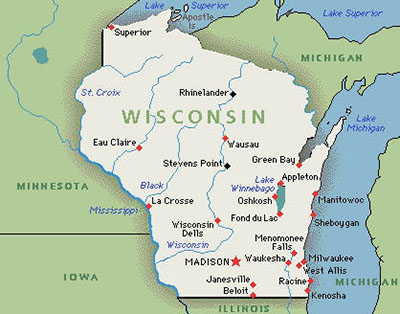by WorldTribune Staff, July 28, 2021
A Wisconsin state lawmaker who traveled to Arizona to witness the full forensic audit of Maricopa County ballots is calling for a similar review of Wisconsin’s 2020 presidential election results.
Meanwhile, the voter integrity group Look Ahead America reported on Tuesday that it has discovered at least 157,299 illegal ballots cast in the Wisconsin presidential election.
 Republican state Rep. Janel Brandtjen, who chairs the Wisconsin Assembly Committee on Campaigns and Elections, said in a press release that “voters have made it clear that they want a thorough cyber-forensic examination of tabulators, ballot marking devices, and other election equipment, which I will be helping facilitate on behalf of the committee as chair.”
Republican state Rep. Janel Brandtjen, who chairs the Wisconsin Assembly Committee on Campaigns and Elections, said in a press release that “voters have made it clear that they want a thorough cyber-forensic examination of tabulators, ballot marking devices, and other election equipment, which I will be helping facilitate on behalf of the committee as chair.”
Brandtjen added: “IP addresses, chain of custody on ballots, and audit trail logs must be thoroughly inspected by cyber-audit technicians… While Wisconsin is in the process of an election audit, I will be working to ensure that it is augmented with expertise and resources to ensure a comprehensive, forensic examination.”
In its Tuesday report, Look Ahead America said the number of ballots they believe to have been illegally cast is about eight times Joe Biden’s reported margin of victory in the state.
The organization reported it identified seven tranches of illegal ballots:
Tranche 1: Early and Absentee Ballots Cast In the Names of Voters (EABCINV) registered illegally.
Tranche 2: Voters Illegally Claiming Indefinite Confinement (IC) Status as a Reason to Vote Absentee. Wisconsin did not allow the COVID-19 quarantine as a reason to claim indefinitely confined status.
Tranche 3: EABCINV matched to permanent, out-of-state moves in the National Change of Address Database (NCOA). At the time we processed this match in mid-November, the database contained records as far back as four years prior to as recent as October 1, 2020.
Tranche 4: EABCINV matched to Out of State Subsequent Registrations (OOSSR) using our national voter database (NVD). In these cases, the voter had registered in Wisconsin and matched to voters subsequently registered in another state.
Tranche 5: Election Day Ballots Cast In the Names of Voters (EDBCINV) registered illegally.
Tranche 6: EDBCINV matched to the NCOA and OOSSR.
Tranche 7: Unmatchable Invalid Residencies Among EABCINV and EDBCINV
Look Ahead America noted: “Not accounting for any illegal ballots in Tranches 5, 6, and 7, we expect the number of illegal ballots to reflect the percentages we found in Tranches 1-4. Likely this number would come in at or around 157,299. This significantly exceeds the margin of victory in the 2020 General Election in Wisconsin, which was 20,695 (as per the vote recount). Whether using the likely projections or the bare minimum, which assumes everything that we did not examine or could not determine was legal, we must conclude beyond a reasonable doubt that the deserved winner of the state of Wisconsin’s Presidential Electoral Votes in the 2020 General Election is unknowable. It also does indicate that widespread voter fraud definitely occurred on a statewide scale as per our findings and Wisconsin’s Supreme Court 2020 ruling, and furthermore that sitting state representatives knew about this situation as per their own family members claiming the status illegally.”
Brandtjen said the audit is warranted considering the amount of private money that went into some of the state’s largest communities under the guise of helping cover the costs of holding elections during a pandemic.
Republicans have raised concerns about grants from a group funded by Facebook founder Mark Zuckerberg. Some 200 communities received grants to help cover election costs, though the bulk of the money went to Milwaukee, Madison, Green Bay, Kenosha and Racine. Republicans have passed a bill to ban such private grants going forward, though it would require Democrat Gov. Tony Evers’ signature to become law.
Federal law requires ballots for a U.S. election to be preserved for 22 months. Under state law, ballots are considered public records and can be accessed once the period for a recount has passed.
INFORMATION WORLD WAR: How We Win . . . . Executive Intelligence Brief
